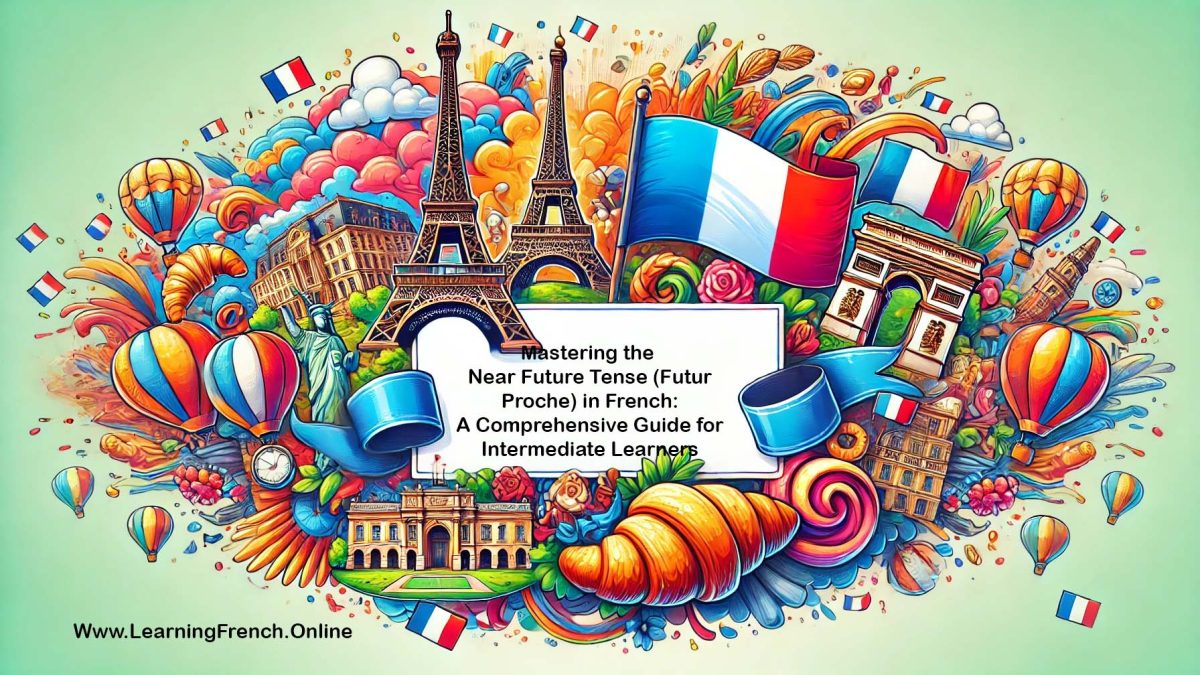
Understanding the Differences Between “Depuis,” “Pendant,” and “Pour” in French
August 26, 2024
Understanding Second Conditional Sentences in French: A Comprehensive Guide for Intermediate Learners
August 27, 2024Mastering the Near Future Tense (Futur Proche) in French: A Comprehensive Guide for Intermediate Learners
As you progress in learning French Grammar , particularly at the B1 level, mastering various tenses becomes crucial for expressing yourself accurately in different contexts. One of the most practical and frequently used tenses in everyday French Grammar is the Futur Proche or the Near Future Tense. This tense allows you to talk about actions that are going to happen shortly, making your conversations more dynamic and relevant. In this guide, we will explore the formation and usage of the Futur Proche, provide numerous examples, and offer practical tips to help you use this tense confidently. By the end of this article, you’ll have a solid understanding of how to use the Futur Proche in your daily conversations.
What is the Futur Proche?
The Futur Proche translates to the “Near Future” or “Immediate Future” in English. It is used to express actions or events that are going to happen soon or in the near future. In English, this tense is often conveyed with the phrase “going to,” as in “I am going to eat,” or “They are going to travel.”
Formation of the Futur Proche
The Futur Proche is relatively simple to form, as it relies on the present tense conjugation of the verb “aller” (to go) followed by the infinitive form of the main verb. Here’s the basic structure:
Structure: Subject + present tense of aller + infinitive verb
Conjugation of “Aller” in the Present Tense:
- Je vais (I am going)
- Tu vas (You are going)
- Il/Elle/On va (He/She/One is going)
- Nous allons (We are going)
- Vous allez (You are going)
- Ils/Elles vont (They are going)
Examples of the Futur Proche:
- Je vais manger (I am going to eat)
- Tu vas partir (You are going to leave)
- Il va étudier (He is going to study)
- Nous allons voyager (We are going to travel)
- Vous allez visiter (You are going to visit)
- Elles vont danser (They are going to dance)
When to Use the Futur Proche
The Futur Proche is used in a variety of contexts to indicate actions that are about to happen or that are planned for the near future. Here are the main scenarios where the Futur Proche is commonly used:
1. Immediate Future Actions
Use the Futur Proche to describe actions that are imminent or about to happen soon.
Examples:
- Je vais sortir dans quelques minutes. (I am going to go out in a few minutes.)
- Ils vont commencer le film. (They are going to start the movie.)
2. Planned or Intended Actions
The Futur Proche is ideal for expressing intentions or plans that have been made for the near future.
Examples:
- Nous allons acheter une nouvelle voiture. (We are going to buy a new car.)
- Elle va rendre visite à sa grand-mère demain. (She is going to visit her grandmother tomorrow.)
3. Predictions Based on Present Situations
Sometimes, the Futur Proche is used to make predictions about the near future, especially when the outcome seems inevitable based on the current situation.
Examples:
- Il va pleuvoir bientôt. (It’s going to rain soon.)
- Tu vas réussir cet examen, je le sais. (You’re going to pass this exam, I know it.)
4. Commands and Suggestions
In informal contexts, the Futur Proche can also be used to give commands or make suggestions in a softer tone.
Examples:
- Tu vas finir tes devoirs maintenant. (You are going to finish your homework now.)
- On va faire une pause, d’accord ? (We are going to take a break, okay?)
Differences Between the Futur Proche and the Futur Simple
While both the Futur Proche and the Futur Simple (Simple Future) are used to talk about future events, they are not interchangeable and serve different purposes.
1. Immediacy vs. General Future
- Futur Proche: Used for actions that are imminent or planned for the near future.
- Example: Je vais partir dans un instant. (I am going to leave in a moment.)
- Futur Simple: Used for actions that will happen further in the future, or when the timing is not immediate.
- Example: Je partirai l’année prochaine. (I will leave next year.)
2. Certainty
- Futur Proche: Often implies a higher degree of certainty, as it usually refers to plans that are already in motion.
- Example: Ils vont déménager la semaine prochaine. (They are going to move next week.)
- Futur Simple: Can be used for future actions that are more hypothetical or less certain.
- Example: Ils déménageront un jour. (They will move one day.)
3. Formation
- Futur Proche: Formed with “aller” + infinitive, making it simpler and more conversational.
- Futur Simple: Formed by adding future tense endings to the infinitive form of the verb.
Common Mistakes and How to Avoid Them
- Confusing Futur Proche with Present Tense:
- Incorrect: Je vais manger maintenant. (This can be mistaken for present tense meaning “I go to eat now.”)
- Correct: Je vais manger dans un instant. (I am going to eat in a moment.)
- Overusing the Futur Proche for Distant Future Events:
- Incorrect: Je vais devenir médecin un jour. (This could be better expressed in the Futur Simple.)
- Correct: Je deviendrai médecin un jour. (I will become a doctor one day.)
- Forgetting the Infinitive Verb After “Aller”:
- Incorrect: Je vais à l’école. (This is present tense meaning “I go to school.”)
- Correct: Je vais aller à l’école. (I am going to go to school.)
- Using “Futur Simple” Instead of “Futur Proche” for Immediate Actions:
- Incorrect: Je mangerai bientôt. (This is correct but less natural for immediate future in conversation.)
- Correct: Je vais manger bientôt. (I am going to eat soon.)
Practice Exercises
To reinforce your understanding of the Futur Proche, try these exercises:
1. Conjugate the following verbs in the Futur Proche:
- Nous (partir) __ demain.
- Tu (voir) __ ce film ce soir.
- Ils (acheter) __ une nouvelle maison.
- Je (faire) __ mes devoirs après le dîner.
- Elle (commencer) __ son nouveau travail lundi. Answers:
- Nous allons partir demain.
- Tu vas voir ce film ce soir.
- Ils vont acheter une nouvelle maison.
- Je vais faire mes devoirs après le dîner.
- Elle va commencer son nouveau travail lundi.
2. Translate the following sentences into French using the Futur Proche:
- I am going to call you later.
- They are going to visit their grandparents this weekend.
- We are going to eat out tonight.
- She is going to study in France next year.
- Are you going to help me with this? Answers:
- Je vais t’appeler plus tard.
- Ils vont rendre visite à leurs grands-parents ce week-end.
- Nous allons dîner dehors ce soir.
- Elle va étudier en France l’année prochaine.
- Vas-tu m’aider avec ça ?
3. Fill in the blanks with the correct form of “aller” and the infinitive verb:
- Je __ (répondre) à ton message dans un moment.
- Ils __ (jouer) au football cet après-midi.
- Vous __ (préparer) le repas ensemble ?
- Nous __ (attendre) le bus ici.
- Tu __ (partir) à quelle heure ? Answers:
- Je vais répondre à ton message dans un moment.
- Ils vont jouer au football cet après-midi.
- Vous allez préparer le repas ensemble ?
- Nous allons attendre le bus ici.
- Tu vas partir à quelle heure ?
Cultural Insights: The Use of Futur Proche in French Daily Life
- Conversational Use: The Futur Proche is more commonly used in spoken French Grammar than the Futur Simple because it is simpler and more direct. French speakers often use it to discuss plans and intentions, making it a key part of everyday conversation.
- Planning and Arrangements: In French culture, planning is important, and the Futur Proche is frequently used to discuss upcoming events, appointments, and activities. Understanding this tense will help you engage in these discussions more effectively.
- Expressing Intentions: The Futur Proche is often used to express intentions, which is a reflection of the French Grammar emphasis on clarity and intention in communication. Whether you’re talking about what you’re going to do this afternoon or next week, the Futur Proche helps make your intentions clear.
Conclusion
Mastering the Futur Proche is an essential step for any French learner at the B1 level. This tense allows you to talk about the immediate future in a way that is natural and conversational. By understanding how to form and use the Futur Proche, you can express your plans, intentions, and predictions with ease.
Remember to practice regularly, both by writing and speaking, to make the Futur Proche a natural part of your French language skills. Pay attention to context to choose between the Futur Proche and the Futur Simple, and use the examples and exercises in this guide to reinforce your learning. Bonne chance (good luck) on your journey to mastering the Futur Proche and becoming more fluent in French!

